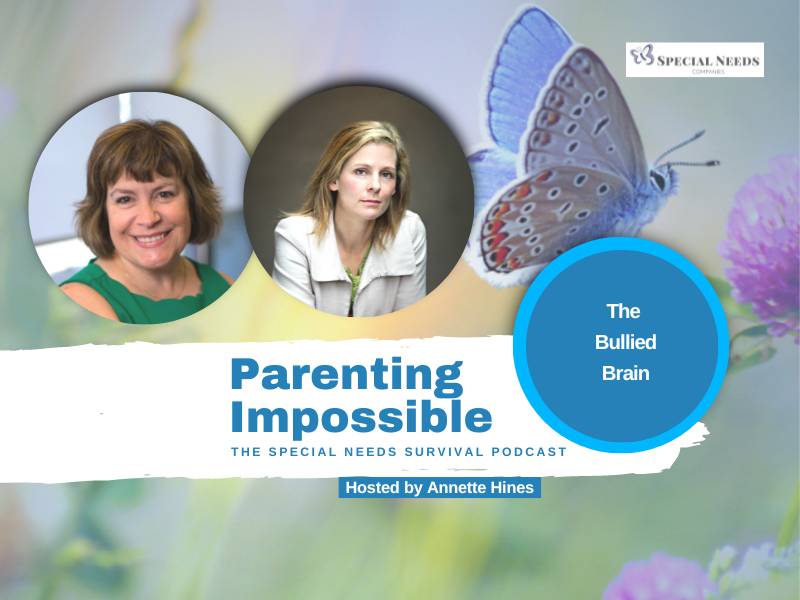Host Annette Hines opens the podcast remembering her daughter Elizabeth who passed away from mitochondrial disease on November 18, 2013, which makes this a difficult time of year for her. To learn more about her journey with Elizabeth and their story, read her, Book: Second Chances and Butterflies. Or listen to one of the previous podcast episodes during which Hines shares their story: Telling Her Story with Annette Hines.
Guest Jennifer Fraser, PhD, founder of The Bullied Brain and four time author discusses the impact of bullying and abuse on the brain and how it can actually rewire brain functioning. While conducting her research, she found that limited research on the brain is available for the general public and most of us are unlikely to learn anything about brain health. In addition, she questions why society tends to focus on children when trying to learn about and curb the incidence of bullying when the normalization of bullying comes from the dysfunctions of adults and our response to cover up the bullying we see everyday.
At the beginning, Fraser shares her personal story about teaching at a school and recording direct reports from students who were being emotionally and physically abused by teachers at her school that helped act as a catalyst for her research and book, The Bullied Brain: Heal Your Scars and Restore Your Health, on brain science, bullying, and abuse. She counters the myth that we tell children to be upstanders against bullies and claim that we have zero tolerance for bullying because bullying and abuse are so prevalent in our lives. By exploring the ways in which our brains are wired to respond to threats and predators, Fraser explains how lasting damage can occur in brain function when we are faced with a recurring threat from an abuser or bully. Previous podcast guests including Parenting Coach Allana Robinson of Uncommon Sense Parenting and Dr. Amy Saltzman M.D. founder and director of Spot a Spider both explain brain functioning including the fight, flight, or freeze response when we are faced with a threat. The brain damage that can occur from abuse or bullying can be seen on brain scans. The sympathetic nervous system response to the repeated abuse keeps the abused and abuser in patterns of fight or flight/freeze that allow them to disassociate certain behaviors from themselves as empathetic, caring people so that the abuse they receive or give behind closed doors continues to go unchecked.
As parents, it’s natural to have difficulty believing our children if they complain about teachers or mention strange activity. Fraser says that we are wired to want to trust those who are close to us or certain levels of authority. And yet, we need to be open to hearing our children’s side of the story and asking more questions when something sounds off or strange. Abuse occurs when a person with authority abuses their position of power. And the rising suicide rate amongst teens and young adults, as noted in our episode Depression and Stress in Teens: What to Look for and When to Seek Help should be a red flag to our society that something is deeply wrong.
However, Fraser notes that the brain is adept at repair and recovery if we follow evidence-based practices to heal ourselves. By comparing the brain’s ability to exercise and strengthen itself through mindfulness to physical exercise, Fraser encourages us to practice daily meditations to strengthen our brains and improve resiliency. She writes in her book, The Bullied Brain: “While I was laser-focused on harm being done to brains, I was not anticipating neuroscientific research that documents how remarkable the brain is at healing. The brain is vulnerable to bullying, especially between the ages of thirteen and twenty-five, but it is is also unbelievably skilled at recovery.”
Learn more about Jennifer Fraser’s research on her website: https://bulliedbrain.com/, as well as her recent article, “How Bullying Can Harm Your Brain.“
Leave us a comment! Let us know if you also have experienced bullying and abuse, and if so, how you have healed from it.

